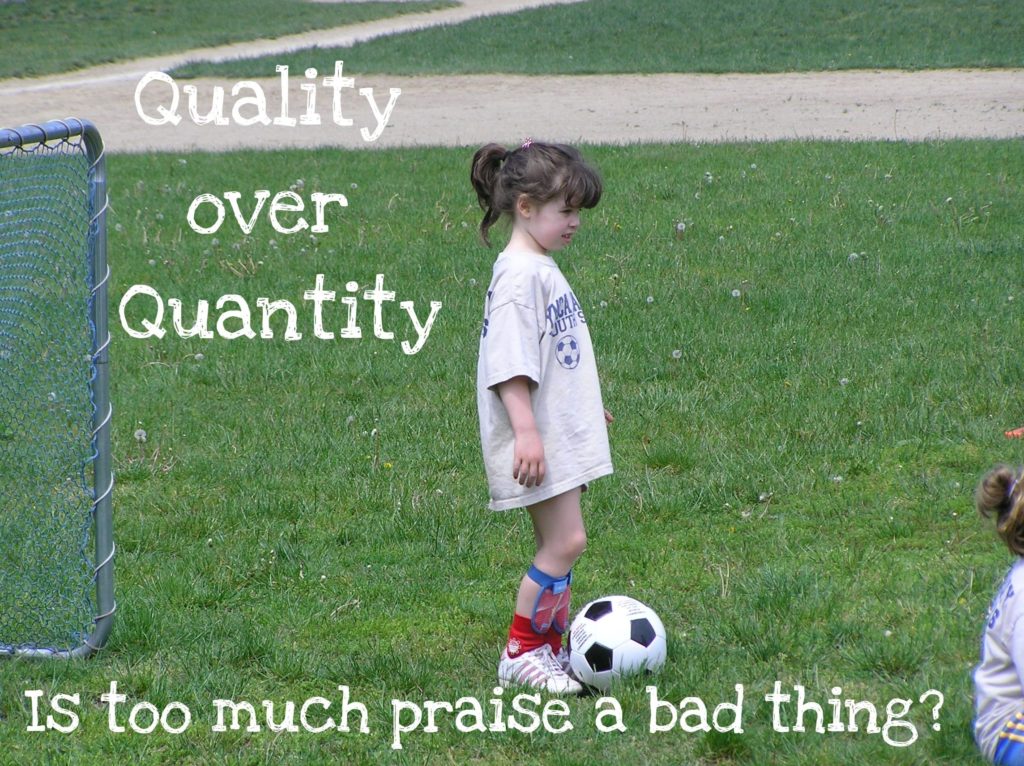While most of us want to give & receive praise, is it really that beneficial?
After all, what is the purpose of praise?
It is to encourage children (people of all ages) to continue to engage in positive behaviors that produce positive outcomes.
Receiving a compliment for a job well done, or a pat on the back for achieving a goal is a wonderful, warm, fuzzy feeling. It can even invoke inspiration to strive for new accomplishments.
Constant criticism has the opposite effect. It will dissuade and demotivate. The task at hand may not be done to the best of our ability or perhaps even remain incomplete. Constant criticism can often be interpreted as bullying.
Critique of your work that comes in the spirit of guidance, advice, and encouragement to seek different, better, or alternate ways to improve is a good thing. You should not run away or discard such advice from a mentor, teacher, or coach.
You might be thinking: What a minute here!
How did something so simple, liking praise become another thing I
need to worry about as a parent (or coach/teacher)?
Here is your answer:
No one ever said parenting was easy. Like I have said many times over, “The toughest job you will ever love. No wimps need apply!”
Plus, being a parent isn’t about you: It is about the children you brought into this world and how to guide them and help them grow into good adults who contribute positively to the world.
(Do not misunderstand this comment; Keep reading, it all comes together in the end.)
Back to the reason we are here: Praise – is too much a bad thing?
What do you do when your child comes to you with their latest and greatest artwork, cooking creation, craft project?
“Wow, good job honey!”
Putting on their coat by themselves? Tying their shoes? Washing their hands, putting away their toys.
“Wow, good job honey!”
Ugh…Please stop telling your kids this.
First, it is lazy.
Second, it lacks specificity.
Neither tells the child(ren) what precisely they did well!
AND without them knowing what they did that was good doesn’t teach them how to do it again to secure the same outcome.
Plus, not everything deserves praise.
In many ways, too much praise can be a bad thing. Excessive praise can backfire. You’ve heard the expression: “Too much of a good thing.” It can lead to a sense of entitlement and narcissism.
The quality, context, and intention behind the praise matter too.
Children need to be told why they did well so they can replicate that behavior in the future to get the same positive outcome.
Of course, you want to praise your child, praise is important and to do that and maximize the benefits, build on the foundation of love and support you already show your child; you need to be SPECIFIC with your praise.
For example: If they made themselves breakfast tell them you are glad they are figuring things out on their own.
If your child just came off the soccer field tell them that you love to watch them play. Or, it looks like you are really connecting as a team out on the field.

Can someone become addicted to praise?
Constantly praising someone can make them addicted to praise. Addiction to praise can be unhealthy and a child’s sense of worth can rely on receiving recognition rather than the inner sense of achievement.
What are some of the unintended consequences to excessive praise?
If you have a child that enjoys drawing and coloring, they do it because the reward for doing it is intrinsic. The reward is the enjoyment.
If that child is given constant praise for this same activity, then the appeal of doing the activity becomes reliant on that contingent reward. Expecting praise for doing things can soon make that thing not worth doing if there is no praise.
Approval itself can become the “extrinsic reward,” the end goal.
A child who is praised often will begin to crave the satisfaction he or she gets from pleasing their parent, teacher, or caregiver. Instead of doing something for the pure joy of it, the child will begin to do it simply for the praise.
Their worth comes from the recognition they get rather than an inner sense of achievement or fulfillment.
When my child asks me “Do you like my picture?”
I reply: “Do you like it?” “Tell me about it?” “Did you have fun making it?”
“Why did you pick that to draw? What else do you like drawing?”
Take a sincere interest in the child’s desire to draw, paint, etc. Not that actual finished project.
Upon completing a task that may deserve acknowledgment an alternate to “Good job” might be:
Thank you for putting away your toys. Putting things away when you are done using them makes it easier to find the next time you want them.
When you help load the dishwasher after meals it gives more time to snuggle and read books with you before bed.
When you put your shoes away when you come into the house ensures no one trips on them and gets hurt. I appreciate your effort in trying to remember to do that. (Keep reading for more info on the importance of acknowledging effort.)
We should be encouraging doing things because they are the right thing to do, and it feels good to contribute not because you are going to be getting something in return.
Check out this related article: Children & Chores: Yes -or- No?
Consider the relatively close comparison of offering too much praise with the dangers of bribing your child. Why are you bribing your child to do what is an expected behavior such as doing their homework and getting good grades, or wearing clean clothes, or being respectful towards others? We should not be constantly praising and or bribing expected, normal behavior.
We don’t want healthy, normal, expected behavior to be seen as exceptional.
Being rewarded, whether with money or over-the-top praise, for doing things you really should be doing anyway, can diminish genuine motivation. ‘If someone has to pay me for doing this, it must not be worth doing for its own sake.’”
Consider this:
As an employee, we get hired and paid based on agreed and negotiated job description and wage. In exchange, we receive a paycheck that affords our house, groceries, etc.
When an employee does well, goes above and beyond, or meets and exceeds expectations, we receive a bonus or a raise. The expectation is that we continue to work at that level and continue to deserve said higher rate or pay, or perhaps an earned promotion.
A child goes to school, that is their job. Their job description is to pay attention to their teacher, complete assigned work and their pay is their grade. The better they do the higher the grade. If they earned an A the expectation is that they will continue to do “A” work, or the grade next term will reflect that and lower to perhaps a “C”.
Just as an employee who earns a promotion and fails to continue to perform will get demoted, or perhaps fired. We cannot fire our kids from school but if they work hard they can bring that grade back up to the desired A.
School is hard work and not everyone is an A student, but rewarding the effort and instilling into the child that they can change said effort and put new practices into place to reach desired grades. Their promotion is the next grade level at the end of the school year rather than a repeat year.
Clark University researcher Wendy Grolnick: “Parental encouragement of learning strategies helps children build a sense of personal responsibility for-and control over-their academic careers.”
Offering a little incentive and a reward for a good job on achieving something particularly hard is a good idea (ice cream, a new book, a playdate, trip to a museum) everyone deserves recognition and motivation. It should not become a normal practice. Children need to know that being proud of themselves is the only “payment” they need.

Children develop a sense of competence by seeing the consequences of their actions, not by being told about the consequences of their actions.
Acknowledging your child’s effort goes a long way.
Researchers Mueller and Dweck found that children who were praised for their effort showed:
- More interest in learning
- Demonstrated greater persistence
- More enjoyment in learning
- Attributed their failure to lack of effort (which they believed they could change)
- Rewarding effort encouraged students to work harder and to seek new challenges.
Part of growing, learning, and becoming a competent, confident adult is failing. Some of the biggest lessons we learn come from failure. Failure is part of the process of learning. We need to make children understand that it is the effort that is important. If they are trying their hardest, learned a lesson, and strive to continue to learn – that is what is to be praised. It is not about the outcome – it is about the effort and willingness to seek knowledge.
So here’s the take-home message:
- Don’t over-praise for doing stuff that should be done anyway. Sure, it’s good I don’t go around stealing from people, but it should also be my normal behavior. So be discerning and selective with praise. Ask yourself: “Am I being praised (or praising someone else) for normal human behavior?”
- Focus on the normality of the desired behavior rather than implying that it’s exceptional and therefore not something that can happen often.
- Don’t expect praise for everything and don’t always praise others, or you’ll be fostering praise dependency and an inability to pursue excellence for its own sake. If you don’t praise all the time, the praise you do offer has more potency.
- Focus on what is actually within a person’s control (like hard work) rather than on meaningless characteristics. “You have worked really hard!” implies that success was something they could influence. Telling someone they are “fabulous” for completing something gives them no meaningful information about their input.
